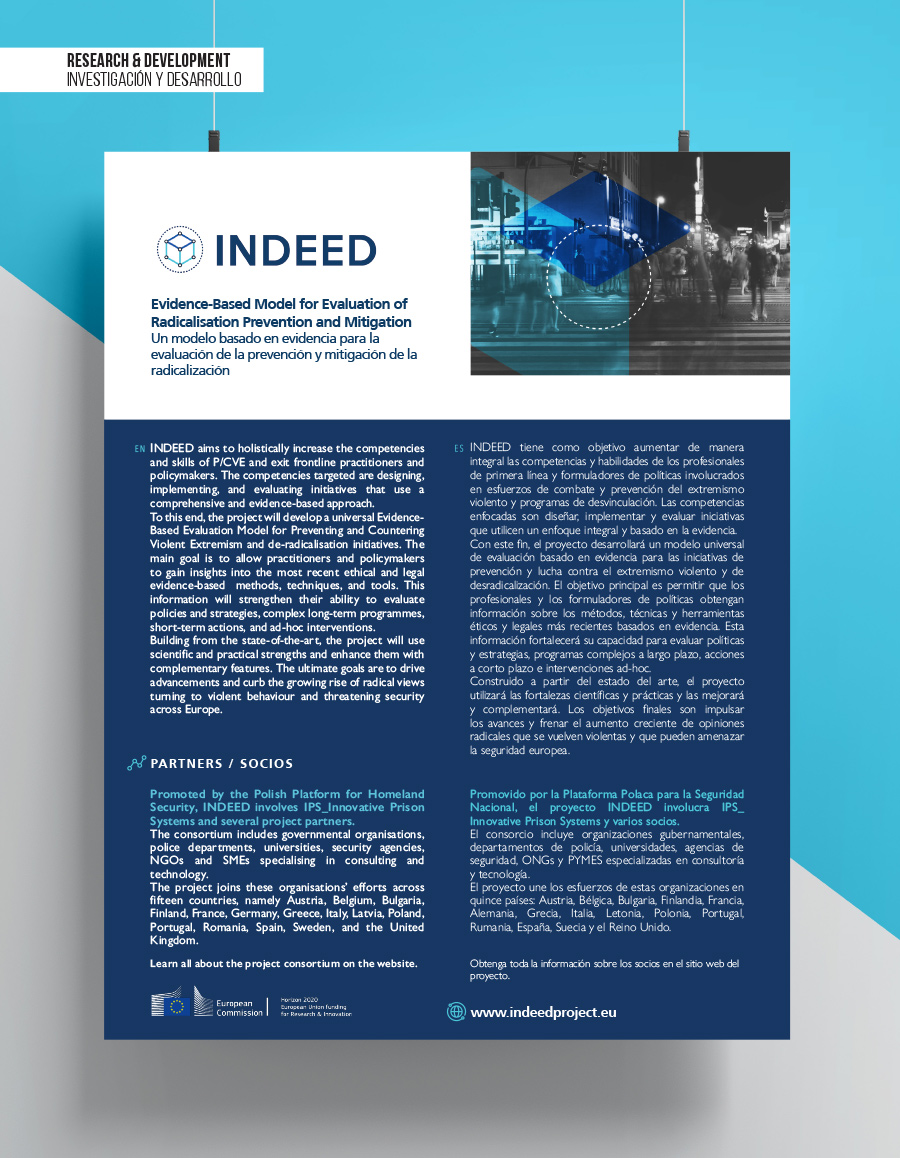Article
Marzena Kordaczuk-Wąs
The European INDEED project, funded under HORIZON 2020, aims to strengthen a comprehensive approach to preventing and countering radicalisation based on a universal, evidence-based assessment model for preventing and mitigating radicalisation.
The consortium of 19 partners from 15 Member States uses an evidence-based approach to strengthen the knowledge, capacity and skills of frontline professionals and decision-makers in the effective design, planning, implementation and evaluation of initiatives in the field of preventing and countering radicalisation leading to violent extremism (P/CVE) and de-radicalisation. Among these initiatives, INDEED highlights four main categories, such as policies and strategies, long-term programmes, short-term actions and ad hoc interventions.
The project outcomes will be included in a comprehensive and practical Toolkit. This multilingual knowledge package will support practitioners and decision-makers working in the field of P/CVE and de-radicalisation, including representatives of the justice system, prison and probation sectors. The Toolkit will assist these professionals in designing and evaluating initiatives using evidence-based principles, tools, training and educational materials.

An important part of the Toolkit is the Evidence-Based Evaluation Model, which conceptualises the main steps that each of these stages of evaluation should cover when conducted in line with the key principles of evidence-based evaluation.
At the heart of the Toolkit is the Evidence-based Evaluation Tool itself, which will guide practitioners and decision-makers through the components and steps of the evaluation design and implementation process. In addition, it will also guide them through the process of designing an initiative, emphasising the need to think about evaluation as an integral element of its assumptions.
In addition, the Toolkit includes the INDEED Digital Research Repository of Studies on Risk and Protective Factors, created based on a review of scientific research on factors that may facilitate (risk factors) or prevent (protective factors) radicalisation processes.
It facilitates the mapping of empirical research and supports the process of designing, planning, implementing and evaluating prevention initiatives. The Toolkit is bolstered by a comprehensive on-site and online training package, which supports the tools’ effective use.
The INDEED project has established a network of SMART HUBS (Stakeholder Multisectoral Anti-Radicalisation Teams) in all 15 countries represented in the consortium. These hubs bring together local actors actively involved in the design, planning, implementation and evaluation of P/CVE and de-radicalisation initiatives.
The SMART Hubs network enabled the INDEED stakeholders to proactively engage from the early stages of the project, ensuring that the project outcomes are co-designed with a user-centred approach, making them directly usable and actionable for a wide range of groups and organisations.
The consortium is engaged in various and ongoing activities, one of which is currently focused on selecting previously implemented or ongoing initiatives in the area of P/CVE and deradicalisation. Using the tools developed as part of the project, the consortium will then support the authors and/or users of selected initiatives in designing new ones or supplementing the existing evidence-based evaluations with missing key components.
Looking ahead to future project activities, we would like to highlight the INDEED International Forum on November 15-16, 2023, which aims to develop the field of evidence-based evaluation and evidence-based policy and practice.
The forum will bring together leading international experts, practitioners, law enforcement and civil society organisations, representatives of governments, the European Commission, the United Nations, universities, research institutes and think tanks, as well as donors, to facilitate multilateral discussions, exchanges, learning from best practices in this area and identifying practical recommendations to improve the application of mentioned evaluation.
The forum will have an innovative ‘online summit’ format and will feature expert contributions and highly informative and participatory workshops, communities of practice, and policy forums.
At the INDEED website, agencies, institutions, and governmental bodies can find more information on how to become a partner of this International Forum on Advancing Evidence-Based Practice & Evaluation in P/CVE / De-Radicalisation and Crime Prevention.
By engaging with the INDEED project, professionals can actively influence and reap the benefits of the initiative by participating in a collaborative environment for the co-design and co-creation of evaluation methodologies, advancing the existing knowledge, through ongoing interaction and communication across various levels.



Marzena Kordaczuk-Wąs, PhD, is an experienced advisor in the law enforcement industry and the coordinator for the INDEED project. She is an expert on radicalisation prevention in the Polish Platform for Homeland Security, and the Co-Chair of the Radicalization Awareness Network (RAN) Police and Law Enforcement Group. Holding a Doctorate of Social Sciences focused on the Sociology of Security from the University of Wroclaw, she is skilled in International Project Management, Rule of Law, Government, Quantitative Research, and Community Policing.



